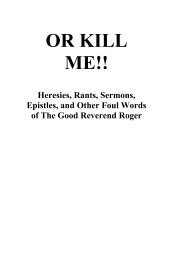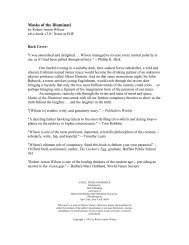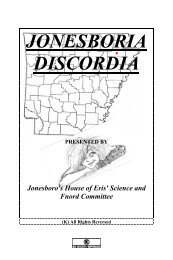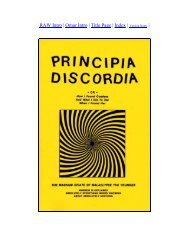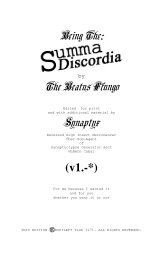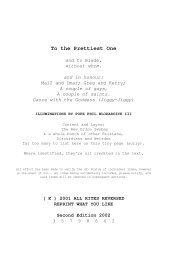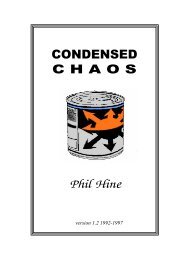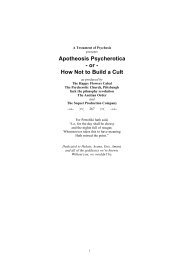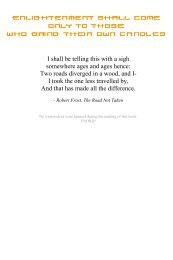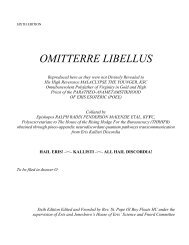Coincidance - Principia Discordia
Coincidance - Principia Discordia
Coincidance - Principia Discordia
Create successful ePaper yourself
Turn your PDF publications into a flip-book with our unique Google optimized e-Paper software.
110 COINCIDANCE<br />
Marx. It doesn't pretend that evil is always due to economics or Oedipus<br />
complexes. It will probably not be popular with people who think that<br />
Arthur Miller, or Maxwell Anderson, or William Inge, are important<br />
playwrights.<br />
Like King Lear, this new Williams tragedy does not pretend to have all the<br />
answers; but, like King Lear, it is brave enough to ask all the questions.<br />
The difference between a great writer and a minor one is fundamentally<br />
this: that the minor writer always has answers—glib answers, slick<br />
answers, memorably-worded answers, resounding and pretentious answers.<br />
The great writer dares to stand before you naked, armed only with his<br />
questions.<br />
Villon is great because he doesn't pretend to know what he doesn't know.<br />
What he does know he tells us in direct language—language so simple that<br />
stupid critics have debated several hundred years now on what makes his<br />
poetry so strong.<br />
What he knows is that hunger makes the wolf devour sheep, and hunger<br />
makes the man kill another for his money, and that people who end up on<br />
the gallows are not much different from those who die quietly in bed. He<br />
knows these things, intimately, and he says them. He knows that most<br />
whores are not glamorous but ugly, and he says that.<br />
Villon doesn't know a damned thing about Professor Lutkopf's essay on<br />
Dr. Kleindenken's commentary on what Marx wrote to Engels in 1872. Or,<br />
if he does know, he doesn't care—anymore than he cares about Aquinas'<br />
commentaries on Aristotle.<br />
Villon is not really much like Tennessee Williams, and I really shouldn't<br />
have dragged him into this article, but the two men do have this thing in<br />
common, that they are not running for President. Arthur Miller, for<br />
instance, is a writer who is always running for President.<br />
Death of a Salesman is to drama what an Eisenhower speech is to rhetoric.<br />
There is in it none of the really frightening, terrible, unspeakable quality<br />
that makes a great tragedy. Everybody knows why Willy Loman suffered<br />
and died; they knew before they went into the theatre.<br />
Death of a Salesman offers, really, nothing but a bland uplift. It tells the<br />
Broadway audience what they want to hear, that the liberal left-wing<br />
philosophy of the '30s was true after all. It has all of the answers, so it doesn t<br />
really ask any of the questions.<br />
The great writer creates situations so true and so urgently significant that<br />
he himself often doesn't "understand" them. I mean that very seriously<br />
When Achilles suddenly weeps, in the great interview with Priam at the end<br />
of the Illiad, Homer is probably as surprised as the rest of us.<br />
Nobody knows why Achilles wept, but we all know that he must have wept;



